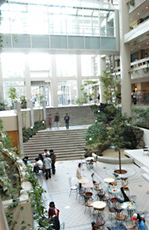School of Psychology
Medium of instruction: Japanese
Language requirement: N2 level in Japanese Language Proficiency Test (JLPT)
Location: Nagoya campus
Overview of the School of Psychology
This program offers an outstanding curriculum for two qualifications: Certified Professional Psychologist and Certified Clinical Psychologist. (Further education in Graduate School is also required.)
Our undergraduate school was founded in 2000 as the first school of psychology in Japan. We focus on the following four areas as the core elements of psychological research: experiment, application, clinical practice, and development.
We have maintained facilities such as laboratories, data analysis labs, a reference room, and a counseling room.
Our excellent off-campus, hands-on instruction includes practical training at support facilities and companies as well as the study abroad program in Australia.
Students who have completed the correspondence courses in our affiliate schools are eligible for a teacher's license for elementary school or school for special-needs education.
Features of the School of Psychology
Department of Psychology
Areas of Study
Experimental Psychology
Students learn the mechanisms of human perception, cognition, memory, and learning both theoretically and experimentally. They are expected to scientifically examine the human mind's information processing system, such as how we see, remember, and learn. For example, why films seem to move or how people remember and recall information.
Clinical Psychology
To support people's recovery from various mental and behavioral problems, students identify the underlying factors of psychological problems, acquaint themselves with theories on understanding personality, and acquire skills in psychological testing and counseling. These skills are the core elements that underpin interpersonal supports in healthcare, education, welfare, etc.
Applied Psychology
This area intends to provide solutions for human behavioral problems in industries and society. Not limited to social psychology and industrial-organizational psychology, students also learn traffic psychology, which is applied in driver aptitude tests and traffic accident prevention measures, as well as color psychology, which explores the relation between colors and human perception.
Developmental Psychology
This area investigates human development from birth to infancy, childhood, adolescence, adulthood, and old age. This field is related to the human lifespan and is significantly affected by one's historical context, thereby requiring students to have broad perspectives and flexible ideas.
